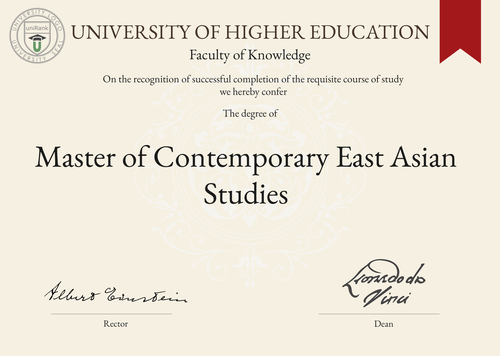
Master of Contemporary East Asian Studies (MCEAS)
Guide to Master of Contemporary East Asian Studies Program/Course/Degree
Master of Contemporary East Asian Studies (MCEAS)

Program Name:
Master of Contemporary East Asian StudiesProgram or Degree abbreviation:
MCEASDuration range:
The duration of the program typically ranges from 1 to 2 years, depending on the university and country.Tuition range:
Tuition fees for the Master of Contemporary East Asian Studies program vary depending on the university and country. It is recommended to check with specific institutions for accurate information.Overview:
The Master of Contemporary East Asian Studies program offers a comprehensive understanding of the political, economic, social and cultural aspects of East Asian countries. Students gain in-depth knowledge of the region's history, international relations, language and contemporary issues.Curriculum Overview by year:
The curriculum is designed to provide a multidisciplinary approach to studying East Asia. It typically includes courses in East Asian history, politics, economics, sociology, language and culture. The program may also offer opportunities for language immersion and study abroad experiences.Key Components:
- In-depth study of East Asian history, politics, economics and culture - Language courses to develop proficiency in a relevant East Asian language - Research and analysis of contemporary issues in East Asia - Opportunities for study abroad or language immersion experiencesCareer Prospects:
Graduates of the Master of Contemporary East Asian Studies program can pursue various career paths. They may find employment in government agencies, international organizations, non-profit organizations, research institutes, or multinational corporations. Career opportunities may include roles in diplomacy, policy analysis, research, consulting, or cultural exchange.Salary Expectations:
Salary expectations for graduates of the Master of Contemporary East Asian Studies program can vary depending on factors such as location, industry and job position. Salaries may range from moderate to high, depending on the specific career path pursued. For a more accurate understanding of salary expectations, you can utilize the Job Sites Search Engine, from our sister site jobRank, which searches over 4,600 job sites worldwide. Make sure to specify not only the job title but also the country you are interested in.Conclusions:
It is important to note that the duration, tuition fees, curriculum, key components, career prospects and salary expectations of the Master of Contemporary East Asian Studies program can vary based on the chosen country or location of study, as well as the chosen university. Prospective students are advised to research and compare different universities and programs to find the best fit for their academic and career goals. Visitors interested in pursuing the Master of Contemporary East Asian Studies degree can search for universities offering this program worldwide through the uniRank World Universities Search Engine. This tool provides a comprehensive database of universities and their respective programs, allowing individuals to explore options and make informed decisions about their education.World Universities Search Engine
search for Master of Contemporary East Asian Studies (MCEAS) and add the Location (country, state etc.) or specific University you are interested in studying at.
Query examples:
- Master of Contemporary East Asian Studies (MCEAS) United States
- Master of Contemporary East Asian Studies (MCEAS) United Kingdom online
- Master of Contemporary East Asian Studies (MCEAS) Australia international students
- Master of Contemporary East Asian Studies (MCEAS) University of California
- Master of Contemporary East Asian Studies (MCEAS) University of London tuition fees
- Master of Contemporary East Asian Studies (MCEAS) University of Sydney scholarships
Share Program/Course
Interesting? Share this program/course/degree info with your friends now.